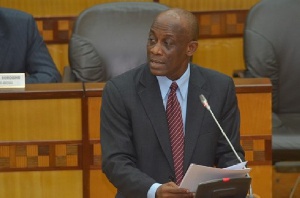Credit ratings agency Moody's Investors Service has maintained that reviewing Ghana's credit worthiness to a better position will largely depend on an improved public debt management.
In a new report on the country, the agency said that Ghana's current sovereign ratings reflect the large financing needs and high debt burden.
"Ghana's B3 rating and negative outlook reflect the sovereign's large gross financing needs, high debt burden and low debt affordability,” Moody's underscored.
Moody's in its annual report maintained that: "Ghana's gross financing needs are expected to reach 20% of GDP over the forecast horizon and the country is facing tight domestic and external funding conditions," said Elisa Parisi-Capone, Vice President, Senior Analyst and co-author of the report.
"Ghana's credit profile is also exposed to lower-for-longer commodity prices which weigh on the balance of payments and fiscal revenues."
Moody's assesses Ghana's fiscal strength as "Very Low", reflecting the country's high debt burden and very low debt affordability resulting from high interest expenditures as a share of GDP and of revenues.
The government's significant foreign currency debt share exposes public debt dynamics to currency volatility.
Moody's is however projecting that Ghana's year-end 2015 fiscal deficit of 6.7% of GDP in cash terms surpassed the budgeted 7.3% target and marked a significant improvement from the 9.4% deficit reported in 2014.
The figures underscore Ghana's commitment to fiscal consolidation which Moody's expects to continue in the current election year.
It was of the view that Ghana's expanding oil and gas production will help to spur economic growth in the coming years. Moody's projects that real GDP growth will accelerate to 5.1% in 2016 and 6.5% in 2017. This compares to 3.9% in 2015.
Moody's also adds that a downward pressure on the rating could arise from delays to fiscal consolidation or renewed setbacks in resolving the country's power crisis or a further sustained decline in oil, gold and cocoa prices or production levels that would put further downward pressure on fiscal revenues and export receipts.
Pressure would also stem from a sustained loss of capital or continued pressure on the balance of payments and international reserves.
Moody's finally maintained that "a change in the outlook to stable could result from sustained fiscal consolidation that would stabilize and eventually reduce the debt burden over the medium term or an improved debt rollover risk profile domestically and externally".
It was also of the view that bolstering of Ghana's foreign exchange reserves that would reduce the country's vulnerability to terms of trade shocks would also be positive.
Business News of Tuesday, 7 June 2016
Source: B&FT













